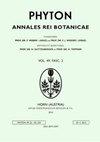Assessment of Nutrient Leaching Losses and Crop Uptake with Organic Fertilization, Water Saving Practices and Reduced Inorganic Fertilizer
IF 0.1
4区 生物学
Q4 PLANT SCIENCES
引用次数: 1
Abstract
The increasing world population has forced excessive chemical fertilizer and irrigation to complete the global food demand, deteriorating the water quality and nutrient losses. Short-term studies do not compile the evidences; therefore, the study aimed to identify the effectiveness of reduced doses of inorganic fertilizer and water-saving practices, hence, a six-year experiment (2015–2020) was conducted in China to address the knowledge gap. The experimental treatments were: farmer accustomed fertilization used as control (525:180:30 kg NPK ha), fertilizer decrement (450:150:15 kg NPK ha), fertilizer decrement + water-saving irrigation (450:150:15 kg NPK ha), application of organic and inorganic fertilizer + water-saving irrigation (375:120:0 kg NPK ha + 4.5 tones organic fertilizer ha), and application of controlled-release fertilizer (80:120:15 kg NPK ha). Each treatment was replicated thrice following a randomized complete block design. The results achieved herein showed that control has the highest losses in the six-year study for total nitrogen (225.97 mg L), total soluble nitrogen (121.58 mg L), nitrate nitrogen (0.93 mg L), total phosphorus (0.57 mg L), and total soluble phosphorus (0.57 mg L) respectively. Reduced fertilizer and water application improved crop nutrient uptake, nitrogen concentration was significantly enhanced with organic and inorganic fertilizer + water-saving irrigation, P concentration was increased with fertilizer decrement + water-saving irrigation, and K concentration was improved with fertilizer decrement + water-saving irrigation. Hence, this study concludes that reduced inorganic fertilizer dose combined with water-saving practices is significantly helpful in reducing nutrient leaching losses and improving nutrient uptake and water pollution. Further studies are needed to explore the impacts of reduced fertilization and water-saving irrigation on leaching losses. The benefits at different climatic conditions, soil types, and fertilizer types with application methods are also a research gap.有机肥、节水和减施无机肥对养分淋失和作物吸收的影响
不断增长的世界人口迫使过量的化肥和灌溉来完成全球粮食需求,使水质恶化和营养流失。短期研究不能收集证据;因此,该研究旨在确定减少无机肥料剂量和节水做法的有效性,因此,在中国进行了为期六年的实验(2015-2020),以解决知识差距。试验处理为:农民习惯施肥为对照(525:180:30 kg NPK公顷)、减肥(450:150:15 kg NPK公顷)、减肥+节水灌溉(450:150:15 kg NPK公顷)、施用有机无机肥+节水灌溉(375:120:0 kg NPK公顷+ 4.5吨有机肥公顷)和施用控释肥(80:120:15 kg NPK公顷)。按照随机完全区设计,每个治疗重复三次。结果表明,在6年的研究中,对照的总氮(225.97 mg L)、总可溶性氮(121.58 mg L)、硝态氮(0.93 mg L)、总磷(0.57 mg L)和总可溶性磷(0.57 mg L)损失最大。减肥减水提高了作物对养分的吸收,有机肥和无机肥+节水灌溉显著提高了氮素浓度,减肥+节水灌溉提高了磷浓度,减肥+节水灌溉提高了钾浓度。因此,本研究认为,减少无机肥用量与节水措施相结合,可显著减少养分淋失,改善养分吸收和水污染。减少施肥和节水灌溉对淋滤损失的影响有待进一步研究。在不同气候条件、土壤类型和肥料类型下的效益与施用方法也是一个研究空白。
本文章由计算机程序翻译,如有差异,请以英文原文为准。
求助全文
约1分钟内获得全文
求助全文

 求助内容:
求助内容: 应助结果提醒方式:
应助结果提醒方式:


